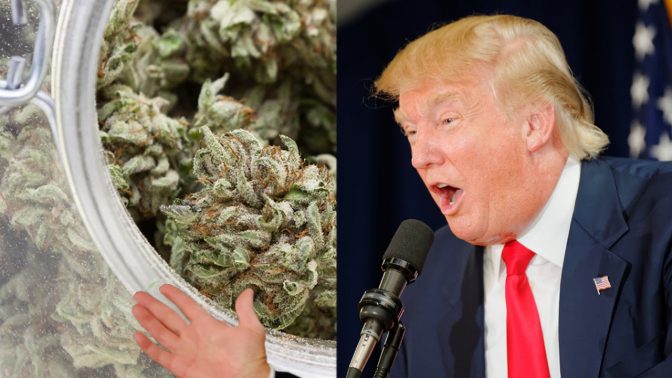The Case Against Donald Trump

Donald Trump is fundamentally unfit for the presidency.
His platform is unviable (building a border wall that would cost billions, which Mexico certainly will not pay for), inconsistent (does he favor deporting millions of undocumented workers, or not?), un-American (proposing religious oaths for individuals entering the country, even if they are American citizens simply returning from overseas), mendacious (stating that President Obama was not born in the U.S., which he recently retracted) and generally a complete mystery (he’s got a great plan to defeat ISIS, but he won’t tell us what it is). Trump cites his business acumen as a crucial selling point, but his track record is nothing but a trail of bankruptcies, unpaid vendors and extorted employees.
All of his policy positions are as malleable as Silly Putty. Trump first said wages in America were too high, then said the minimum wage should be raised. He initially proclaimed that the wealthy need to pay more in taxes, then revealed a plan filled with handouts to the top 1%. After saying climate change was impacting the conditions of one of his golf courses, he backtracked and decided it was actually a hoax originating in China. Most notoriously, at a televised town hall forum on MSNBC, Trump suggested that women who have abortions should face some form of punishment, then recanted later that day.
Clearly, Donald Trump has no core political philosophy or conviction whatsoever. His main motivation is himself, and garnering attention to feed his ego. More than a decade ago, Trump leaned Democrat, was pro-choice and thought all drugs should potentially be legalized. But he’s since jettisoned those positions to become a modern-day George Wallace, appealing to the far-right, nativist segment of the population.
Trump on Pot
Those who contend that Donald Trump is secretly in favor of marijuana legalization and scaling back the War on Drugs are sadly mistaken. They base their argument on interviews he gave in the late 1990s and early 2000s. But, as we’ve learned, Trump’s word is about as valuable as a decade-old dime bag of ditch weed. He’ll say and do just about anything to further his brand, and given his boorish conduct during the presidential campaign, it’s clear that Trump has hitched himself to the social-conservative bandwagon.
Trump has often said that he supports medical marijuana. “I think medical should happen,” he stated last October. “I really believe we should leave it up to the states.”
However, his position on full legalization is a far cry from the libertarian positions he spouted when he was simply a businessman and TV star. At the Conservative Political Action Conference (CPAC) in March, Trump said, regarding full legalization: “I think it’s bad, and I feel strongly about that. They’ve got a lot of problems going on right now in Colorado, some big problems.”
In an interview on ABC’s This Week in July, he reiterated his personal opposition to marijuana legalization. “It’s not something that I would want to do,” he stated. “But it’s something that certainly has been looked at, and I looked at it. If we police properly, we shouldn’t [have to] do that.”
A teetotaler, Trump claims to have had no personal experience with marijuana. It certainly shows in these muddled, out-of touch comments:
• “In Colorado, the book isn’t written on it yet, but there’s a lot of difficulty in terms of illness, and what’s going on with the brain and the mind and what it’s doing.”
• “[Marijuana legalization] is a big problem… [Marijuana has] tremendously damaging effects to the mind, to the brain, to everything.”
• “There’s a lasting negative impact. You do too much of it… there’s a loss of something, so that book has not been written yet, but it’s gonna be written pretty soon and I’m not hearing very positive things.”
Trump’s Anti-Drug Allies
Donald Trump has surrounded himself with ardent prohibitionists. His running mate Mike Pence is an extremely vocal opponent of reforming the nation’s marijuana laws. During his 2012 campaign for governor of Indiana, Pence’s biggest campaign donor was the private prison corporation Geo Group.
Pence presides over a state that has some of the nation’s most outdated and severe cannabis laws; in Indiana, possession of any amount is punishable by a $1,000 fine and 180 days in jail. In 2013, he opposed the legislature’s attempt to pass a bill that would have lowered the penalties for pot, while not fully decriminalizing it. “I think we need to focus on reducing crime, not reducing penalties,” Pence opined. Just this year, he signed a bill that allows judges to sentence drug offenders with 10-year mandatory-minimum jail terms.
Pence is most infamously known for backing the state’s Religious Freedom Restoration Act in 2015, which discriminates against the LGBT community. That put him on the national radar—and Trump didn’t hesitate to make Pence his choice for VP.
The other two individuals in Trump’s inner orbit need slightly less introduction: former New York Mayor Rudy Giuliani, and New Jersey Governor Chris Christie. While serving as mayor, Giuliani made his name as a leader in the “tough on crime” movement. Stop-and-frisk greatly increased under his administration, New York City arrested more people for simple possession than any other city in the nation (peaking with 51,267 arrests in 2000) and Giuliani routinely derided efforts to implement any drug law reforms. During his short-lived run for president in the 2008 election, Giuliani made his stance clear on legalization: “There’s no reason for it.” (He has served as a consultant for Purdue Pharma, the manufacturer of OxyContin.)
A very long article could be written about Christie’s opposition to cannabis law reform. He did everything in his power to block implementation of New Jersey’s medical-marijuana program after he took office in 2010, and signed a bill calling for mandatory treatment for individuals charged with pot possession. During his failed run for the Republican presidential nomination this year, Christie previewed what prohibition would look like in his administration in an interview with Fox & Friends: “Marijuana is against the law in the states, and it should be enforced in all 50 states.” At a New Hampshire town hall, he sent a chilling warning to those living in currently legal states, declaring: “If you’re getting high in Colorado today, enjoy it, [because] as of January 2017, I will enforce the federal laws.”
Fortunately, Christie lost in the primaries, but here’s a frightening thought: He and Giuliani are Trump’s leading candidates for U.S. Attorney General.
In addition to Trump’s anti-pot stances, the GOP itself still opposes any movement on marijuana reform. The Republican Party platform, authored and approved at their convention in July, rejected planks that would have supported medical marijuana, much less overall legalization
Just Say No to Trump
There are three other candidates who are all better on the marijuana issue than Donald Trump. Hillary Clinton has said she supports rescheduling and state-level legalization, and the Democratic Party platform now has a strong position in favor of dialing back the War on Drugs. The two other candidates—Gary Johnson and Jill Stein—both back marijuana legalization. Take your pick—but for the sake of the country and the future of marijuana law reform, don’t vote for Trump.
If you enjoyed this Freedom Leaf article, subscribe to the magazine today!

